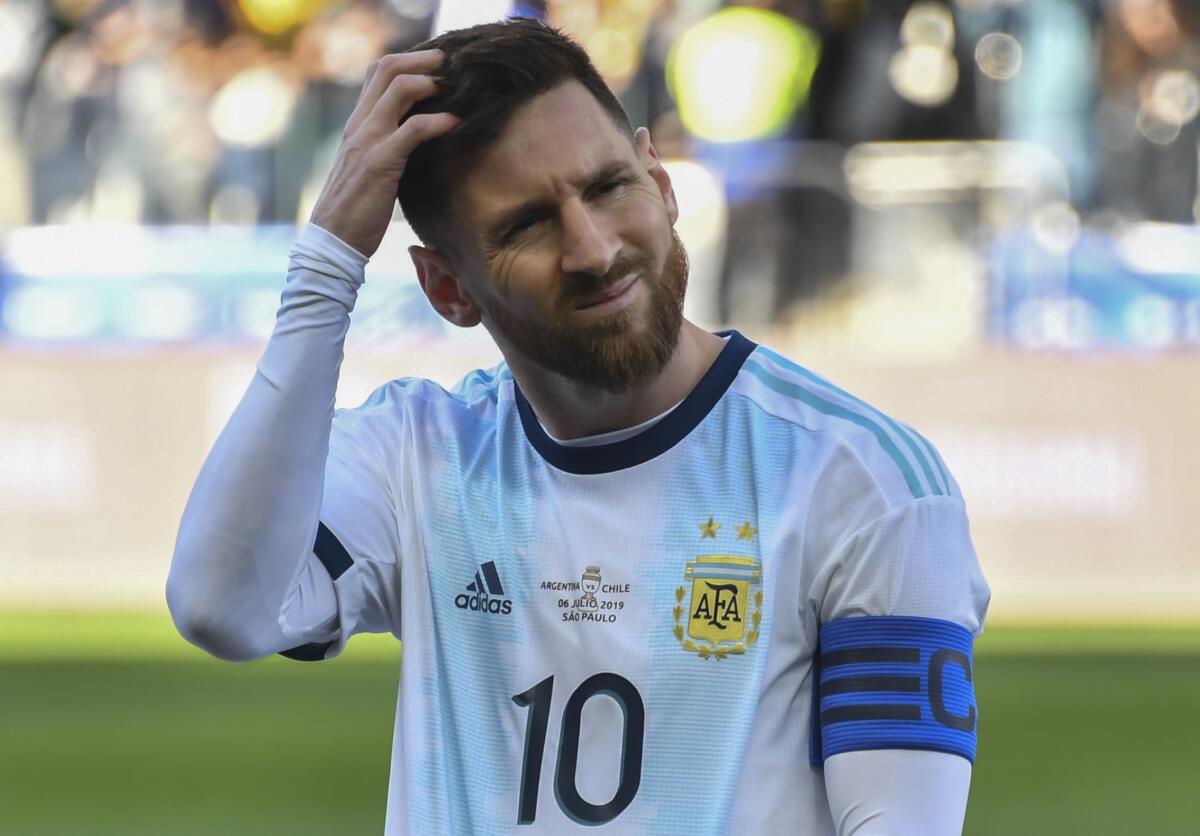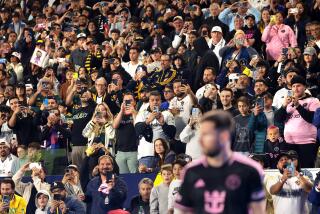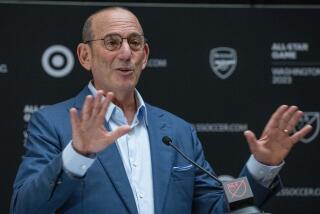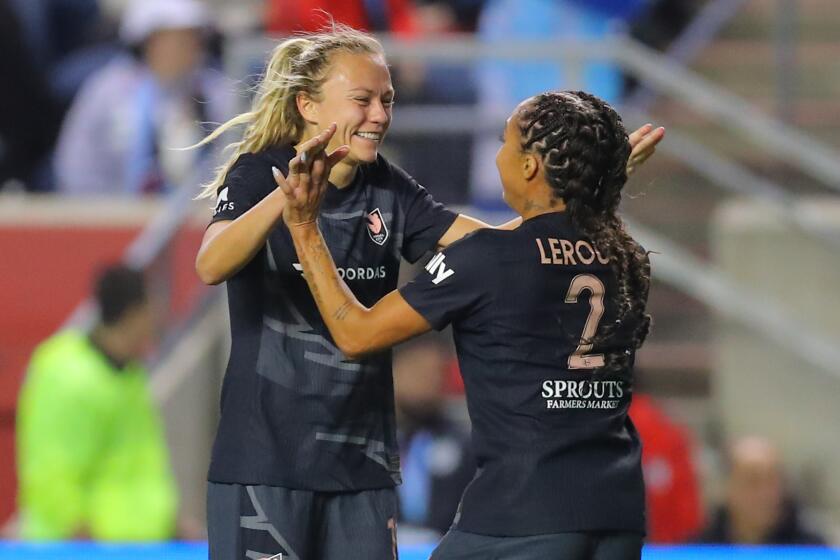No Messi, no thanks: the challenges of staging a soccer friendly

It’s not quite noon on a Monday, just the start of the work week, but Rodger Champagne already looks tired as he slides behind a table in a darkened restaurant dining room a couple of blocks from the Coliseum. The Canadian TV and music producer is four months into his first try at putting on an international soccer match and it’s not going well.
“After I do this thing, I think I’ll go run for prime minister of Canada,” he said with a wan smile. “It’s got to be easier to run a country than promoting these soccer games.”
Especially after Lionel Messi, the marquee player for Thursday’s Argentina-Chile game, was suspended from playing in the match two months after Champagne agreed to stage it, leaving him with 77,500 tickets to sell and no headliner to sell them with.
To break even, Champagne estimates he’ll have to fill half the Coliseum; as of Tuesday morning, only about 10,000 tickets had been bought. Meanwhile the Sept. 10 friendly between Brazil and Peru at the Coliseum has already sold more than 30,000 tickets, promoters of that game say.
The difference? Argentina will be without Messi, Sergio Aguero, Angel Di Maria and just about every other player you’ve ever heard of. Brazil is bringing Neymar, Ederson, Dani Alves and Roberto Firmino.
Champagne’s losses could reach seven figures while the New York-based Relevent Sports Group, which is putting on the Brazil game, should make a small profit.
One stadium, two games, two wildly different results.
“I guess I could sit here and sort of cry in a beer. But I’m not going to,” Champagne said as he nursed a latte. “It’s a political world that I don’t understand.
Orange County Soccer Club’s Michael Orozco grew up in Anaheim, trained in Mexico and now helps with the “Pathway to Professional” soccer program.
“Now that we’re kind of through the disappointments, I want to concentrate on what we have.”
And what he has is a tremendous challenge.
Champagne, who splits his time between British Columbia and Los Angeles, was approached late last spring about staging Thursday’s Argentina-Chile friendly at the Coliseum after the event’s original organizer had to pull out. That left him and his company, Hit Song Productions, just four months to put together a plan for promoting an event he had little knowledge of and no experience with.
So he started by doing his homework.
“We scouted this out. This is nothing to take lightly,” he said.
But this was Argentina and Messi, he was told. What could go wrong?
Plenty as it turned out.
Last month CONMEBOL, the governing body for soccer in South America, suspended Messi for three months for criticizing the confederation during this summer’s Copa America. The ban will sideline him for three international exhibitions, the first of which comes Thursday.
The next blow came from Argentine coach Lionel Scaloni, who called up a roster with fewer stars than a cloudy night, choosing 16 players who have less than five international appearances apiece for La Albiceleste.
In a matter of weeks, Champagne went from promoting arguably the best player in soccer history and the 10th-ranked team in FIFA’s world rankings to trying to sell tickets to see a group of little-known youngsters wearing Argentine jerseys.

That’s not an uncommon occurrence, say others with experience putting on other international soccer matches in the U.S., though they declined to address Champagne’s troubles on the record to avoid sounding critical of a competitor.
What was uncommon, however, was what Champagne did about it; when Argentina’s depleted roster was announced, he reduced ticket prices, raising the water in the financial bath he was already taking.
“We decided right away we were going to hit that head on,” he said. “We priced Messi in, [but] he’s not there and Aguero’s not there. You have to look at the facts and the facts are the best players haven’t come.”
So the prices for high-end tickets were halved, to $75; the least expensive are $25. Tickets for Brazil-Peru range from $40 to $150.
“We’re looking at the reality and we’re saying, ‘How can we give the fans a really good value whoever [plays]?’” Champagne said.
Putting on a match with top-flight national teams such as Argentina and Brazil can cost more than $2 million, said one veteran promoter, who estimated the appearance fees of the two South American teams are among the top three in the world.
The easiest way to recoup that, he said, was through a long-term deal with the country’s soccer federation, one that ties both sides to the success of the relationship and gives the promoter the ability to ride out short-term rebuilds of a team’s roster.
Maccabee Los Angeles materialized virtually overnight in 1971, won five U.S. Open Cup championships, then disappeared just as suddenly 11 years later.
Consider that Brazil, like Argentina, is bringing more than a dozen players with fewer than 10 international caps to Los Angeles next week. But because it is deep in a 10-year promotional agreement with Relevent, which is, along with Soccer United Marketing, one of the most prolific promoter of international soccer in the U.S., it is also helping to sell the game by bringing Neymar, plus eight starters from July’s Copa America final.
“There’s not a check coming two days after the match and it’s, ‘Hey, see you later. We’re never going to work together again.’ This is your partner,” said Daniel Sillman, chief executive of Relevent, which has staged more than 100 matches in the U.S. over the last eight years.
Champagne’s relationship with Argentina, on the other hand, will end after Thursday’s match. But he says he’ll be back — hopefully under better circumstances.
“I’ve learned a lot,” Champagne, who remains positive and energetic despite the setbacks, said, this time with a genuine smile.
“This is the classic David and Goliath story. And the story is that you only have as much power as you’re given. We can make this issue clear to people and go, ‘Look, let’s go fix this down the road.’ We’re not casting blame and pointing fingers.
“What the reality is, is you have to make it a situation where the fans, the promoter and the teams are working together.”







